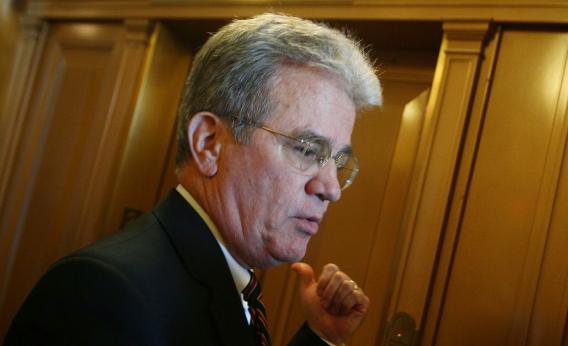One thing you might think would be an opportunity for left-right synergy on health care policy would be the idea of opening up the basic elements of medical practice to people other than highly paid doctors. Medicine isn’t interior decorating and the case for some occupational licensing is pretty clear. Still, doctors are very scarce, very highly trained, and very expensive so it seems clear that there’s money to be saved by letting nurses and physicians’ assistants and other lower-paid personnel take on a larger share of the market for health care services. At the margin, rules preserving certain lines of business as the exclusive purview of MDs is just one of the ways that rich people use the government to pad their own incomes.
Tom Coburn, a staunch conservative and a medical doctor is someone I might have looked to for leadership on this topic. Unfortunately, it looks like he’s a friend of the doctors’ cartel first and a free marketer second:
Ezra Klein: You talk about needing more primary care, one possible option would be deregulating the licensing structure, letting nurse practitioners do more, letting Minute Clinics take a larger role, but that’s not something you hear from the left or the right.
Tom Coburn: I think scope of practice and licensing is a state issue. The federal government, if you read the Constitution, has no role in that. But you never see the downside of less than well trained physicians in the care. It sounds really neat that I can use a nurse practitioner, but I don’t think nurse practitioners or physician’s assistants should practice alone without a physicians. No one ever studies the long-term consequences. Can you, with two years of training as a PA, compete with somebody with eight years of medical training?
It seems to me that’s the question can you with two years of training as a PA compete with somebody with eight years of medical training? We’ll never know if it’s illegal. But I think common sense is that, yes, there is a segment of the health care services market that can be adequately served by nurse practitioners or phyisicians’ assistants practicing alone. I would note the important point here that Coburn doesn’t deny that there are patients who can be competently treated by non-doctors. What he denies is that non-doctors should be legally allowed to treat those patients without a full-fledged MD getting a cut of the profits.
The federalism issue seems like largely a red herring in this context. Medicare and Medicaid are federal programs and give the federal government ample leverage to force the licensing issue if congress wants to.
